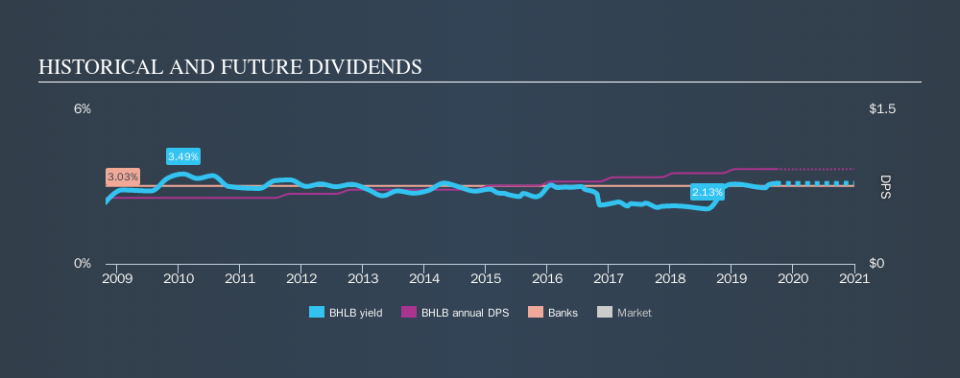Is Berkshire Hills Bancorp, Inc. (NYSE:BHLB) A Smart Pick For Income Investors?

Today we'll take a closer look at Berkshire Hills Bancorp, Inc. (NYSE:BHLB) from a dividend investor's perspective. Owning a strong business and reinvesting the dividends is widely seen as an attractive way of growing your wealth. Yet sometimes, investors buy a stock for its dividend and lose money because the share price falls by more than they earned in dividend payments.
A high yield and a long history of paying dividends is an appealing combination for Berkshire Hills Bancorp. We'd guess that plenty of investors have purchased it for the income. Some simple research can reduce the risk of buying Berkshire Hills Bancorp for its dividend - read on to learn more.
Explore this interactive chart for our latest analysis on Berkshire Hills Bancorp!
Payout ratios
Dividends are usually paid out of company earnings. If a company is paying more than it earns, then the dividend might become unsustainable - hardly an ideal situation. So we need to form a view on if a company's dividend is sustainable, relative to its net profit after tax. In the last year, Berkshire Hills Bancorp paid out 45% of its profit as dividends. A medium payout ratio strikes a good balance between paying dividends, and keeping enough back to invest in the business. One of the risks is that management reinvests the retained capital poorly instead of paying a higher dividend.
Consider getting our latest analysis on Berkshire Hills Bancorp's financial position here.
Dividend Volatility
Before buying a stock for its income, we want to see if the dividends have been stable in the past, and if the company has a track record of maintaining its dividend. Berkshire Hills Bancorp has been paying dividends for a long time, but for the purpose of this analysis, we only examine the past 10 years of payments. The dividend has been stable over the past 10 years, which is great. We think this could suggest some resilience to the business and its dividends. During the past ten-year period, the first annual payment was US$0.64 in 2009, compared to US$0.92 last year. Dividends per share have grown at approximately 3.7% per year over this time.
While the consistency in the dividend payments is impressive, we think the relatively slow rate of growth is unappealing.
Dividend Growth Potential
While dividend payments have been relatively reliable, it would also be nice if earnings per share (EPS) were growing, as this is essential to maintaining the dividend's purchasing power over the long term. Berkshire Hills Bancorp has grown its earnings per share at 3.9% per annum over the past five years. A payout ratio below 50% leaves ample room to reinvest in the business, and provides finanical flexibility. Earnings per share growth have grown slowly, which is not great, but if the retained earnings can be reinvested effectively, future growth may be stronger.
Conclusion
To summarise, shareholders should always check that Berkshire Hills Bancorp's dividends are affordable, that its dividend payments are relatively stable, and that it has decent prospects for growing its earnings and dividend. We're glad to see Berkshire Hills Bancorp has a low payout ratio, as this suggests earnings are being reinvested in the business. Second, earnings growth has been mediocre, but at least the dividends have been relatively stable. Berkshire Hills Bancorp has a credible record on several fronts, but falls slightly short of our standards for a dividend stock.
Companies that are growing earnings tend to be the best dividend stocks over the long term. See what the 5 analysts we track are forecasting for Berkshire Hills Bancorp for free with public analyst estimates for the company.
Looking for more high-yielding dividend ideas? Try our curated list of dividend stocks with a yield above 3%.
We aim to bring you long-term focused research analysis driven by fundamental data. Note that our analysis may not factor in the latest price-sensitive company announcements or qualitative material.
If you spot an error that warrants correction, please contact the editor at editorial-team@simplywallst.com. This article by Simply Wall St is general in nature. It does not constitute a recommendation to buy or sell any stock, and does not take account of your objectives, or your financial situation. Simply Wall St has no position in the stocks mentioned. Thank you for reading.

